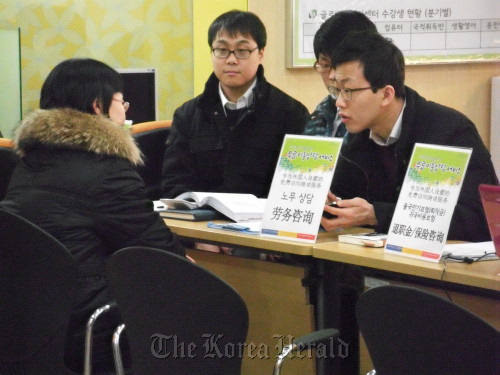Yeongdeungpo District has the largest population of Chinese-Korean immigrants in capital
Chui We-loong works all throughout the week for very little pay. And after emigrating from Harbin, China, eight years ago and marrying a Korean man, Chui felt it was time to set up her own knitting business.
“I didn’t know how much I would need, or how to find a location, or who I need to receive permits from,” said Chui.
That’s why Chui came to the Onsite Counseling session held by the Seoul Metropolitan Government on Sunday.
Held in the Yeongdeungpo Global Village Center, the rotating session focused on Chinese and Chinese-Korean immigrants, helping them with medical, employment, legal, tax, labor and national pension issues.
Yeongdeungpo District has the highest population of Chinese-Korean immigrants (33,827) in the capital and one of the largest populations of Chinese immigrants (1,082) as well.
Here Chui was able to receive all the information that she needed in one spot, plus more.
“They are so nice here. Even though my Korean pronunciation is so bad, they are still so patient,” said the 47-year-old.
“They told me what I need to do to get the process going,” she said.
Chui is not alone when it comes to enjoying the benefits the center offers.
Chinese-Koreans fill the center, waiting for a chance to speak with experts, including those from the National Pension Service and the Korea Exchange Bank.
In another room someone is receiving medical treatment for a backache.
According to Kim Tae-kyun, who oversees the Onsite Counseling service, Chui is a good example of why most immigrants from China come to the session in the district.
“Chinese-Korean immigrants have an easier time finding employment, because a lot of them speak Korean, and their visa has fewer restrictions,” said Kim.
Chui We-loong works all throughout the week for very little pay. And after emigrating from Harbin, China, eight years ago and marrying a Korean man, Chui felt it was time to set up her own knitting business.
“I didn’t know how much I would need, or how to find a location, or who I need to receive permits from,” said Chui.
That’s why Chui came to the Onsite Counseling session held by the Seoul Metropolitan Government on Sunday.
Held in the Yeongdeungpo Global Village Center, the rotating session focused on Chinese and Chinese-Korean immigrants, helping them with medical, employment, legal, tax, labor and national pension issues.
Yeongdeungpo District has the highest population of Chinese-Korean immigrants (33,827) in the capital and one of the largest populations of Chinese immigrants (1,082) as well.
Here Chui was able to receive all the information that she needed in one spot, plus more.
“They are so nice here. Even though my Korean pronunciation is so bad, they are still so patient,” said the 47-year-old.
“They told me what I need to do to get the process going,” she said.
Chui is not alone when it comes to enjoying the benefits the center offers.
Chinese-Koreans fill the center, waiting for a chance to speak with experts, including those from the National Pension Service and the Korea Exchange Bank.
In another room someone is receiving medical treatment for a backache.
According to Kim Tae-kyun, who oversees the Onsite Counseling service, Chui is a good example of why most immigrants from China come to the session in the district.
“Chinese-Korean immigrants have an easier time finding employment, because a lot of them speak Korean, and their visa has fewer restrictions,” said Kim.

Most immigrant laborers in the country hold an E-9 visa for Non-professional Employment, while Chinese-Korean immigrants hold F-4 visas as overseas Koreans.
“A lot of the time Chinese immigrants and particularly Chinese exchange students seek startups in Korea that involve trade,” said Kim Hae-kyung, a manager at the Seoul Global Center.
“There has been a growing number of Chinese university students studying here that wish to open businesses that utilize trade with China,” said Kim.
Aside from business, most immigrants visit the center to receive an on-the-spot medical consultation and treatment by an Oriental medicine doctor.
“A lot of the work that they do is physical so they come in with aches and pains,” said Kim.
“Also they sometimes come in with mental ailments as well from cultural stress,” said Gang Dong-Cheol, who has been practicing Oriental medicine for 22 years.
Sun Jung-hoong came into the center too, because she had an ache in her hand.
“They were really friendly. I came in and got treated by the doctor and now I feel fine,” said 50-year-old Sun from China.
“I was just about to call my friends to tell them about the center.”
All of these services are available for free on weekdays to immigrants outside of the Onsite Counseling session, but the Seoul Global Center brings all the services to one convenient location on Sundays.
And although there is only so much the session can do, it opens doors for those immigrants who visit the center.
“Probably less than half the issues brought here will get settled today, but this session will lead to further personalized sessions and counseling,” said Kim.
But Kim noted that immigrants from China use the service the least among immigrant groups.
“Chinese people usually figure out things on their own by tapping into their own community,” he said.
Roughly 100 immigrants visited the center on Sunday.
The service began in 2009 and offers counseling in daily issues for foreigners living in highly foreign populated areas such as Itaewon and Daerim Village.
This year, the service expanded to include help in finance and telecommunications as well.
The service is offered every Sunday from 12 p.m. to 4 p.m.
As of September there were more than 279,000 foreign residents living in the capital.
By Robert Lee (robert@heraldcorp.com)
-
Articles by Korea Herald












![[Today’s K-pop] BTS pop-up event to come to Seoul](http://res.heraldm.com/phpwas/restmb_idxmake.php?idx=644&simg=/content/image/2024/04/17/20240417050734_0.jpg&u=)





![[KH Explains] Hyundai's full hybrid edge to pay off amid slow transition to pure EVs](http://res.heraldm.com/phpwas/restmb_idxmake.php?idx=652&simg=/content/image/2024/04/18/20240418050645_0.jpg&u=20240418181020)

![[Today’s K-pop] Zico drops snippet of collaboration with Jennie](http://res.heraldm.com/phpwas/restmb_idxmake.php?idx=642&simg=/content/image/2024/04/18/20240418050702_0.jpg&u=)